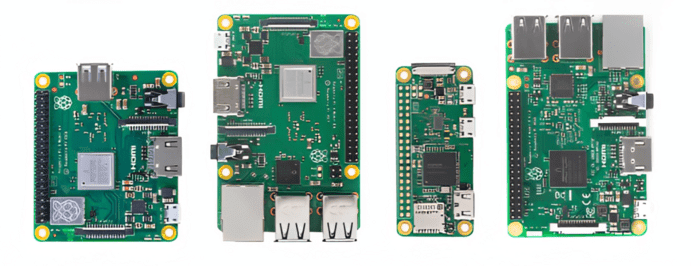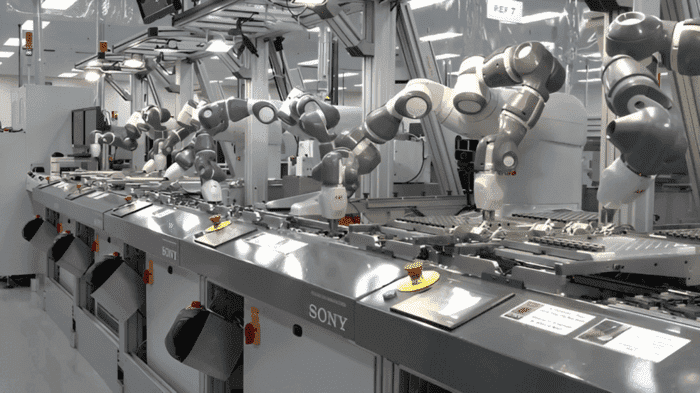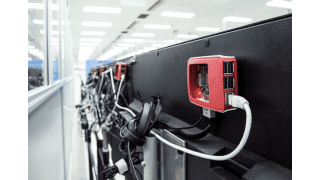Your shopping cart is empty!

From Education to Industry: The Transformation of Raspberry Pi
- Abdulrahman Alhamed
- 12 Aug 2023
- News
- 989
In recent years, a small but remarkable technology has become significant in industries – the Raspberry Pi. Initially designed as a low-cost computer for learning, the Raspberry Pi has expanded its reach to various industrial uses. This article explores how the Raspberry Pi has evolved from a tool for hobbyists to a valuable resource in industrial settings.
The Journey of Raspberry Pi

Let's talk about how the Raspberry Pi went from being a tool for learning in schools to being really useful in big industries. At first, the Raspberry Pi was like a little computer buddy for students. It was small, didn't use much energy, and helped kids learn about computers and programming. But then, something interesting happened.
People realized that the Raspberry Pi could do more than just help students learn. It had some special qualities that made it a good fit for big industries too. They made tougher versions of it, like the Compute Module series, so it could handle the tough jobs industries needed.
Factories and businesses saw that the Raspberry Pi could help them work better. It started doing things like controlling machines in factories and taking care of far-away equipment. The Raspberry Pi's ability to connect to the internet also came in handy. It helped with gathering data in real-time, which means right when it's happening. This data helped industries make smart decisions.
So, what used to be a friend to students in classrooms became a big help in industries. As the Raspberry Pi keeps getting better, it keeps showing that it's not just for school, it's for the big world of work too.
Industrial Integration of the Raspberry Pi

As the Raspberry Pi improved, it naturally found its way into commercial and small industrial ventures, thanks to its growing abilities. Its different parts smoothly integrated into various digital devices, such as cameras, media players, tools for communication, and portable music synthesizers. It even found applications in unique areas, like automating homes and recording data on the international space station. Many companies recognized this potential and took advantage of it by embedding Raspberry Pi modules into their industrial automation systems.
However, the major step into industries happened when they released the first Raspberry Compute Module in 2014. After the regular Raspberry Pi gained popularity among everyday users, they began creating new versions specifically for businesses. They gathered all the essential components of the Raspberry Pi and placed them on a small board that could easily fit into a special slot.
The Compute Module was intended for integration into specialized PCBs or carrier boards designed for specific purposes. This provided hardware designers with more flexibility in shaping its physical dimensions, and engineers with expanded options for input/output (I/O) connections. Industries could adapt the Raspberry Pi Compute Module to meet their particular requirements. In later versions, it could be conveniently plugged into a USB port or mounted onto a DIN rail, showcasing its impressive versatility.
How Is Raspberry Pi Used In Industry?

The versatile nature of the Raspberry Pi has led to its adoption across a wide range of industrial applications, transforming the way businesses operate and innovate. From manufacturing floors to remote installations, the Raspberry Pi finds utility in various ways:
- Automation and Control Systems: Raspberry Pi serves as a reliable control center for industrial automation, overseeing machinery and processes. It facilitates real-time monitoring, data collection, and precise control adjustments, enhancing efficiency and reducing human intervention.
- Internet of Things (IoT) Solutions: With its connectivity features, Raspberry Pi becomes a key component in IoT ecosystems. It seamlessly collects data from sensors and devices, enabling businesses to make informed decisions based on real-time insights.
- Quality Control: Raspberry Pi's image processing capabilities aid in quality assessment. It can analyze visual data from production lines to identify defects and anomalies, ensuring products meet high standards.
- Data Logging and Analysis: Industries rely on data to optimize operations. Raspberry Pi excels at gathering and analyzing data in real-time, helping businesses monitor performance, identify trends, and make data-driven decisions.
- Remote Monitoring and Management: The ability to connect to networks makes Raspberry Pi an ideal tool for remotely monitoring assets. Industries with distributed infrastructure, such as utilities and oil rigs, use it to track equipment health, predict maintenance needs, and prevent downtime.
The adaptable nature of Raspberry Pi ensures that its applications in industry are not limited to a predefined set. Its open-source community, vast software libraries, and customizable hardware interfaces empower industries to tailor solutions to their unique requirements. As technology continues to evolve, so does the role of Raspberry Pi in shaping innovative approaches across diverse industrial sectors.
The Future of Raspberry Pi in Industry

Looking ahead, the Industrial Raspberry Pi market is projected to expand, with a forecasted size of $385 million by 2026, growing at a rate of 15.7% from 2021 to 2026.
Several factors contribute to this growth. The preference for wireless networking devices in industries, along with Raspberry Pi's role in industrial protocols and IoT adoption, drives this trend. Moreover, as industries embrace automation and intelligent warehousing, the Raspberry Pi's influence is set to expand further.
The road ahead holds exciting possibilities. Raspberry Pi's ability to enable IoT-connected devices, streamline processes, and guide data-driven decisions will continue to grow. As industries adopt automation and tap into IoT benefits, the Raspberry Pi's compact computing power will prove pivotal in enhancing efficiency, cost-effectiveness, and innovation. This ongoing trajectory emphasizes the lasting importance of Raspberry Pi as a transformative tool in the industrial landscape.
Conclusion
Raspberry Pi's journey from a hobby tool to an industrial game-changer is truly remarkable. Its versatility in automation, IoT, and data analysis has changed how industries work. As the industrial Raspberry Pi market grows due to wireless networking, IoT, and automation, its impact will keep getting stronger. Raspberry Pi's role in making industries efficient and innovative is a clear sign of its importance in shaping the future.
Related Products
IRIV PiControl - IR4.0 CM4 Industrial Controller
RM1,345.00++
 International
International Singapore
Singapore Malaysia
Malaysia Thailand
Thailand Vietnam
Vietnam

